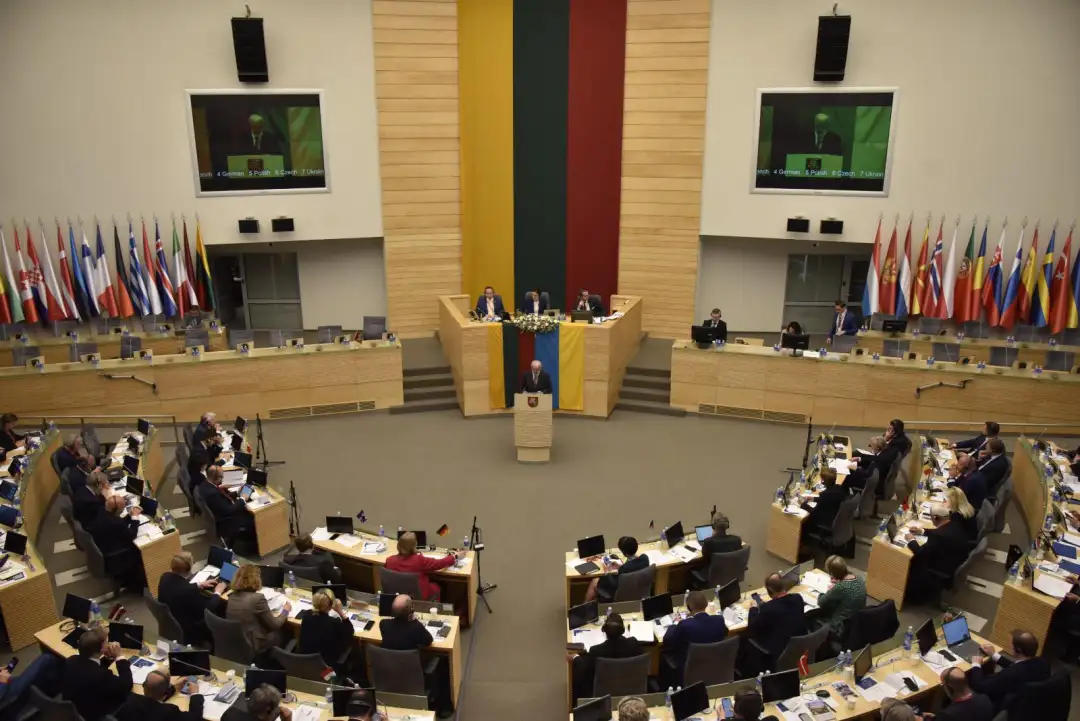Xhaferi: Strengthening existing partnerships and looking for new ones

We have no other alternative but to continue to fight for the survival of the rule of law system, over the system of rule of force and changing the borders with the use of force, said the President of the Parliament Talat Xhaferi in his address to the High Level Meeting of Presidents of Parliaments of NATO member countries "Global Challenges, Global Partners, Global NATO", which is being held today and tomorrow in Vilnius.
Our battle, Xhaferi pointed out, must continue resolutely by strengthening existing partnerships and seeking new, creative partnerships and alliances with countries and organizations that still believe in a world based on democratic and liberal values, their protection, long-term sustainability and resistance to these negative processes. As representatives of the people, it remains for us to continue to promote the faith and correctness of multilateralism, as the only mechanism that enables peace and prosperity in the world.
He emphasized that the country, by fulfilling its strategic goal - joining NATO, managed to protect independence, territorial integrity, the inviolability of internationally recognized borders, but also to promote good neighborly policy and stability in the wider region.
- My country, the Republic of North Macedonia, is an example of a country that was an importer, and today is an exporter of peace, an active partner and contributor to the Alliance. Our commitments to contribute to global peace and security are a guide for our institutions, for their continuous preparation of capacities and abilities to participate in the international missions and operations of NATO, but also of the European Union and the United Nations Organization, said Xhaferi.
He pointed out that the new global security and geopolitical trends carry threats to the security of states, which require the building of appropriate response mechanisms and more comprehensive action by all stakeholders.
Changes in the security environment, Jaferi pointed out, do not allow threats to be perceived separately, as before, but require the modernization of capacities and readiness for decisive action. Here I would particularly highlight the growing impacts of third countries, migration flows and climate change, pandemics, hybrid threats, fake news and disinformation, the fragility of supply systems, dependence on strategically important resources and artificial intelligence.
According to Xhaferi, today we are unfortunately witnessing different concepts of the application and functioning of multilateralism, as well as the introduction of new models of supposed alternative democracy. Such regulatory systems, he pointed out, provide internal legal guarantees for unlimited rule, for justified demonization of political opponents, denial and criminalization of freedom of speech. What is even more worrying, he said, is their tendency to export the remodeled democracy beyond their borders and win other states into the newly created order. Among the instruments they use to challenge the global democratic political landscape are hybrid threats, fake news and disinformation that directly affect the security of our societies, all without the use of military or military weapons.

- Their targeted influence through an ideological war already affects our democratic resilience, reduces citizens' trust in democratically elected governments and parliaments and citizens' perception that institutions have the capacity to deal with these phenomena. Our region of the Western Balkans is a living witness of these activities, especially in the last decade. The question that arises here is whether NATO is changing and whether we as member countries and as parliaments contribute to that change and adaptation for the future? I am personally convinced that so far we have successfully dealt with the problems and that in the history of the Alliance, we have never been more united for its survival and the promotion of its values and opportunities on the world political and security scene. In this complex multi-polar world, which causes globalization and multilateralism, he added, as states and politicians we must act quickly and prevent this kind of fragmentation, because it represents a serious threat to the whole world, Xhaferi said.
The presidents of the parliaments of the NATO member countries, the president of the NATO Parliamentary Assembly, Joël Guério Meillam, the assistant secretary general of NATO for public diplomacy, Baiba Braze, on behalf of the secretary general of NATO Jens Stoltenberg and the president of the Verkhovna Rada, are participating in the event. of Ukraine, Ruslan Stefanchuk, announced the parliamentary press service.
The discussion is divided into three panels: Global Challenges, Global Partners, Global NATO,
Internal Transformation: Increasing Defense Spending, Strengthening Deterrence and Defense Forces, and A Strong and Independent Ukraine: A Long-Term Support Plan for Ukraine and President Xhaferi is slated to be a keynote speaker in the first panel by the organizer.
On the sidelines of the meeting, the participants are scheduled to watch a demonstration exercise performed by members of the NATO battle group "Enhanced Dropped Presence".
The Macedonian delegation is led by MPs Mile Talevski, Dragan Kovacki and Vjolca Ademi.


